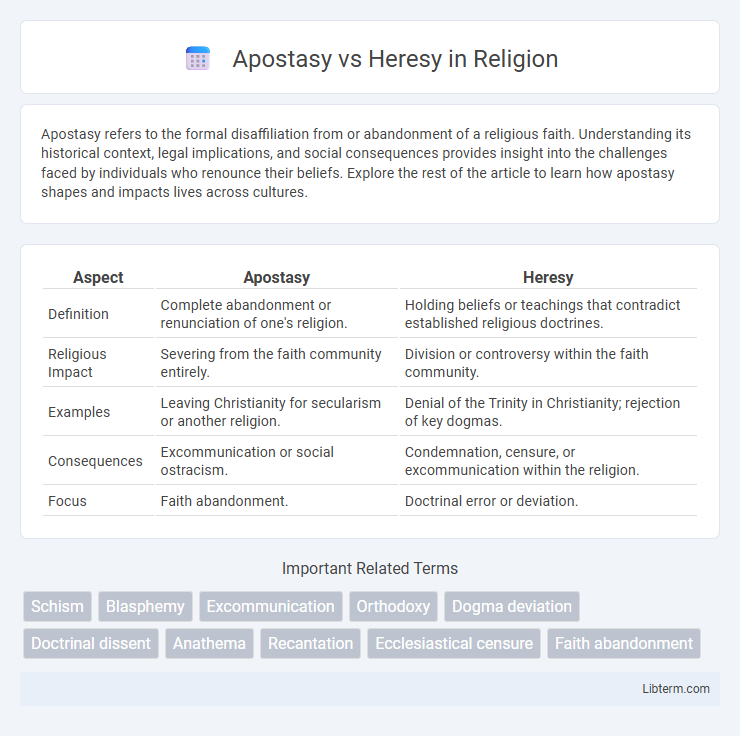Apostasy refers to the formal disaffiliation from or abandonment of a religious faith. Understanding its historical context, legal implications, and social consequences provides insight into the challenges faced by individuals who renounce their beliefs. Explore the rest of the article to learn how apostasy shapes and impacts lives across cultures.
Table of Comparison
| Aspect | Apostasy | Heresy |
|---|---|---|
| Definition | Complete abandonment or renunciation of one's religion. | Holding beliefs or teachings that contradict established religious doctrines. |
| Religious Impact | Severing from the faith community entirely. | Division or controversy within the faith community. |
| Examples | Leaving Christianity for secularism or another religion. | Denial of the Trinity in Christianity; rejection of key dogmas. |
| Consequences | Excommunication or social ostracism. | Condemnation, censure, or excommunication within the religion. |
| Focus | Faith abandonment. | Doctrinal error or deviation. |
Understanding Apostasy: Definition and Origins
Apostasy refers to the complete renunciation or abandonment of a previously held religious belief, often involving a formal or public declaration of disassociation. It originates from the Greek term "apostasia," meaning defection or revolt, historically used to describe early Christian abandonment of faith. Understanding apostasy requires recognizing its implications in religious communities as a decisive break from core doctrines, distinguishing it from heresy, which involves deviation but not outright abandonment of faith.
Exploring Heresy: Meaning and Historical Context
Heresy refers to beliefs or doctrines that deviate from established religious teachings, often leading to conflict within faith communities throughout history. In Christianity, heresy has been historically defined by ecumenical councils, such as the Council of Nicaea, which condemned Arianism, a belief denying the divinity of Christ. The persecution of heretics during the Middle Ages, including the Inquisition, showcases the profound impact heresy had on religious and political structures.
Key Differences Between Apostasy and Heresy
Apostasy involves the complete renunciation of one's religion or faith, signifying a total abandonment of core beliefs, while heresy refers to the adherence to beliefs or doctrines that deviate from established religious orthodoxy without fully rejecting the faith. Apostasy often results in formal excommunication or social ostracism, whereas heresy typically leads to theological debate or corrective measures within the religious community. The key difference lies in apostasy's total repudiation versus heresy's partial dissent from accepted doctrines.
Apostasy in Major World Religions
Apostasy, the formal disaffiliation or renunciation of a religion, is treated with varying degrees of severity in major world religions such as Islam, Christianity, and Judaism. In Islam, apostasy is often viewed as a grave sin with both theological and legal consequences, sometimes punishable by death under Sharia law, though interpretations vary widely among Muslim communities. Christianity generally approaches apostasy as a spiritual fall or sin, with consequences focused on ecclesiastical discipline or eternal damnation rather than legal sanctions, while Judaism considers apostasy as abandoning the covenant with God, often resulting in social ostracism rather than formal punishment.
Heresy Through the Lens of Religious Doctrines
Heresy, viewed through religious doctrines, represents a deviation from established beliefs, often challenging essential tenets of faith and leading to doctrinal correction or excommunication. Unlike apostasy, which entails complete renunciation of faith, heresy involves partial dissent or distortion within the faith community's accepted teachings. Religious institutions historically have defined and enforced orthodoxy to maintain theological purity and communal unity against heretical interpretations.
Historical Cases of Apostasy and Heresy
Historical cases of apostasy include the early Christian figures who renounced their faith under Roman persecution, such as the apostle Peter's initial denial of Christ. Heresy is exemplified by figures like Arius, whose teachings on the nature of Christ led to the Arian controversy and the Council of Nicaea in 325 AD. Both apostasy and heresy significantly shaped doctrinal definitions and church authority throughout history.
Theological Implications of Apostasy vs Heresy
Apostasy entails a complete renunciation of one's faith, resulting in a fundamental break from core theological beliefs, while heresy involves the adherence to doctrines that deviate from orthodox teachings without abandoning the faith entirely. Theological implications of apostasy include the loss of salvation and exclusion from the faith community, whereas heresy challenges doctrinal purity and prompts corrective measures like councils or excommunication. Distinguishing apostasy from heresy is crucial in ecclesiology and soteriology because it impacts how religious authorities address belief, repentance, and forgiveness.
Social and Legal Consequences of Apostasy and Heresy
Apostasy, the formal renunciation of one's faith, often triggers severe social ostracism and legal penalties in many countries, including imprisonment or even capital punishment in some Islamic states. Heresy, defined as beliefs or opinions contrary to orthodox religious doctrines, historically incurred excommunication, social exclusion, and, in certain eras, legal prosecution under blasphemy laws. The social consequences of apostasy typically involve familial rejection and community alienation, while heresy frequently sparks institutional sanctions by religious authorities aiming to preserve orthodoxy.
Apostasy and Heresy in Modern Times
Apostasy in modern times often involves the explicit renunciation of religious faith, frequently leading to significant social and legal consequences in various countries. Heresy today generally refers to beliefs or practices that deviate from established doctrines within a religious community, sparking internal debates but rarely the severe penalties seen historically. Contemporary digital platforms amplify both apostasy and heresy discussions, influencing religious identity and freedom worldwide.
Navigating Faith: Preventing Apostasy and Heresy
Preventing apostasy and heresy requires a strong foundation in biblical doctrine and regular community engagement to reinforce faith. Churches should implement continuous teaching programs emphasizing core theological truths and encourage open discussions to address doubts and misconceptions. Strengthening personal spiritual disciplines such as prayer, study, and fellowship helps believers remain resilient against deviations from orthodox beliefs.
Apostasy Infographic

 libterm.com
libterm.com